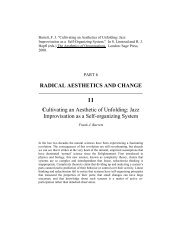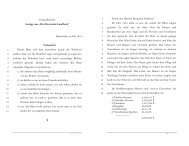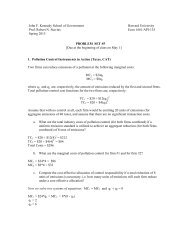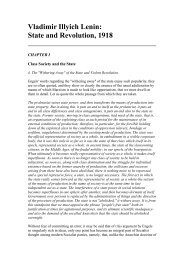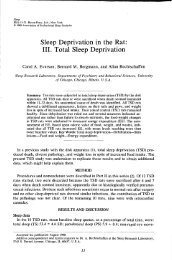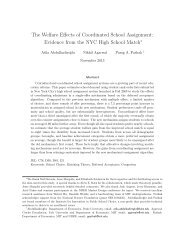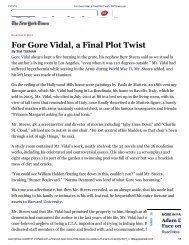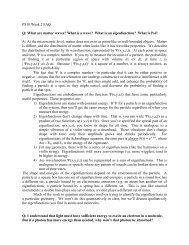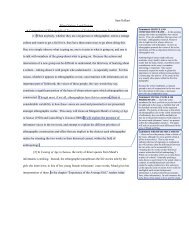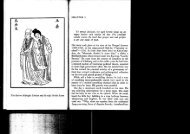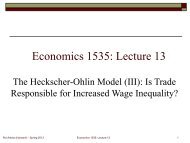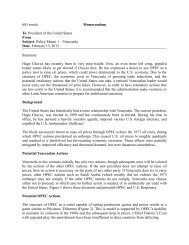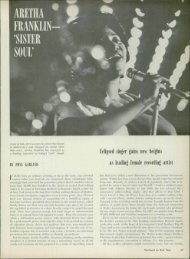McIsaac_ElectiveAffinities - iSites
McIsaac_ElectiveAffinities - iSites
McIsaac_ElectiveAffinities - iSites
Create successful ePaper yourself
Turn your PDF publications into a flip-book with our unique Google optimized e-Paper software.
Tableaux Vivants and Triviality 175<br />
•"Brockhaus, Conversations-Lexikon. Allgemeine deutsche Real-Encyklopddie fiir die<br />
gebildeten Stande. 15 vols. 9th ed. (Leipzig: Brockhaus,1843-1848): 14: 72. See also Langen,<br />
"Attitude und Tableau," 234-35.<br />
'"'Holmstrom, Monodrama, attitudes, tableaux vivants, 216-27, 226.<br />
'"By the mid-1800s, large guidebooks to tableaux production were available, explaining<br />
the requisites for individual scenes as well as their cultural significance. See Edmund Wallner,<br />
Eintausend Sujets zu lebenden Bildem. Ein Verzeichnifi von mehr als 1000 kleineren wie grofieren<br />
Genrebildem, historischen Gruppen und biblischen Tableaux. (Erfurt: Er. Bartholomaus,<br />
n.y.) and E. Sedouard, Das Buch der lebenden Biider. Mit begleitenden Versen zu jedem der<br />
lebenden Biider sowie genauer Angabe der Stellung der Personen und Stellungsplanen fUr grossere<br />
Gruppenbilder. (Berlin: Blochs Theater-Buchhandlung, 1890).<br />
•"Holmstrom, Monodrama, Attitudes, Tableaux Vivants, 209. Jooss, Lebende Biider,<br />
218-19.<br />
••^Margaret H. Ward, "Ehe und Entsagung: Eanny Lewald's Early Novels and Goethe's<br />
Literary Paternity." Women in German Yearbook 2 (1986): 61. See also Kolbe, Goethes "Wahlverwandtschaften,<br />
" 81 - 85.<br />
"'See the arguments of Burger, Leben schreiben, 64-65, and Ward, "Ehe und Entsagung,"<br />
63. Analyses of Lewald's narrative strategies in her autobiography, which stress this kind of variation,<br />
are also worth reading in this context. See Ruth-Ellen Boetcher Joeres, Respectability and<br />
Deviance: Nineteenth-Century German Women Writers and the Ambiguity of Representation.<br />
(Chicago: U of Chicago P, 1998): 91-100. Robert C. Euhrmann, "Masculine Eorm/Eeminine<br />
Writing: The Autobiography of Fanny Lewald." Transforming the Center, Eroding the Margins:<br />
Essays on Ethnic and Cultural Boundaries in German-Speaking Countries. Eds. Dagmar C.G.<br />
Lorenz and Renate S. Posthofen. (Rochester, NY: Camden House, 1998): 104-05. Katherine R.<br />
Goodman, Dis/Closures: Women's Autobiography in Germany Between 1790 and 1914. (New<br />
York: Peter Lang, 1986): 149.<br />
*'Burger, Leben schreiben, 36.<br />
'^Btirger, Leben schreiben, 36. Jooss, Lebende Biider, 234-38.<br />
''Jooss' reading goes farther in appreciating how Schopenhauer was not deploying tableaux<br />
merely to contrast Gabriele and Aurelie (234-35).<br />
'••Langen notes the use of attitudes in educating young girls, but claims this is neither<br />
new nor noteworthy (247). In this context, Jooss refers to the attitudes without analyzing them<br />
(234-35).<br />
''Johanna Schopenhauer, Gabriele. 3 vols. (Eschborn: D. Klotz, 2000). Rpt. of Johanna<br />
Schopenhauer, Samtliche Schriften vols. 7-9. (Wien: Ch. Fr. Schade, 1825). Orthography follows<br />
from facsimile of 1825 edition, which paginates each book separately. In what follows,<br />
GI, G2, and G3 refer parenthetically to the respective books, followed by page numbers. Cited<br />
here: GI: 30-31.<br />
""Jooss, Lebende Biider, 97.<br />
"Holmstrom, Monodrama, Attitudes, Tableaux Vivants 223. Jooss, Lebende Biider, 94.<br />
'* Jooss, Lebende Biider, 94.<br />
''Katherine R. Goodman, "Johanna Schopenhauer (1766-1838), or Pride and Resignation."<br />
Out of Line / Ausgefallen: The Paradox of Marginality in the Writings of Nineteenth-<br />
Century German Women. Eds. Ruth-Ellen Boetcher Joeres and Marianne Burkhard. (Amsterdam:<br />
Rodopi, 1989): 188. As Norbert Miller points out, Genlis's practices were widely publicized in<br />
Europe. Miller, "MutmaBungen," 114.<br />
"'Goodman, "Schopenhauer," 192.<br />
'^'Only in her diary does Gabriele begin to examine her emotional state, however, the<br />
trope also surfaces there (GI: 102, 103, 106). Even in the diary, Gabriele cannot dispel her confusion<br />
and the diary is then abandoned (GI: 117). Though Gabriele's "weak spark of life" might<br />
have contributed to Gabriele's silence, as Anna Richards argues, her attitudes-based education<br />
compounds and reinforces that tendency ("Suffering, Silence, and the Female Voice in German<br />
Fiction around 1800." Women in German Yearbook 18 [2002]: 97).<br />
''^Burger hkewise points to overdetermination as a key component of Schopenhauer's<br />
narrative strategy (71—72).<br />
''•'See the diary entry on GI: 102 for an exemplary expression of this point.



